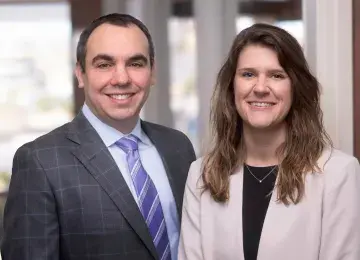Defending Dreams in Challenging Times

Jeremy Love and Samantha Armstrong, RWU Law Class of 2006 and 2018
Juris DoctorAlumni-led immigration law firm educates and advocates for clients
2012 was an important year in immigration law, as the Obama administration’s Deferred Action for Childhood Arrivals (DACA) program opened a new category of legal status for undocumented immigrants who arrived in the U.S. under the age of 18, so-called “Dreamers.” Hundreds of thousands of Dreamers applied for the DACA program after it began accepting applicants in August of that year.
2012 also was the year Jeremy Love L’06 founded the Love Law Firm, a full-service immigration firm in Alabama. In the early days, Love’s office space wasn’t ready yet and he met with clients and potential clients wherever he could, including at a barbecue restaurant where one client worked and a tienda (shop) next door to his rental space. “In that little store they owned, the family was there and I would be talking to them, and just sitting back and drinking Cokes and eating peanuts and talking about different things,” Love recalls.
Thanks in part to the uptick in immigration-related work from DACA applicants, the firm quickly grew from those humble beginnings. In September of 2024, another RWU Law graduate, Samantha Armstrong L’18 joined the firm, bringing her own complimentary experience to the firm from years in the nonprofit immigration sector.
“People have rights”
As it was in 2012, the Love Law Firm is in the midst of another hectic time. In addition to their caseloads, Love and Armstrong are busy with public education efforts like giving “know your rights” presentations.
According to Love, misinformation on social media and even from lawyers can push people toward spending on questionable legal filings. “Immigration law itself hasn't changed. Only Congress can do that,” Love notes. “There are certain policy changes that have made things more difficult or more risky, but the law itself is the same that it was before, and people have rights, and that's important to know.”
Love’s advocacy for, and clear communications to, his clients come naturally. “I remember in high school, I was already thinking about law school, and part of it was helping out the little guy.” He was also an avid reader and enjoyed the works of lawyers-turned-authors like John Grisham and Terry Brooks. A favorite English teacher was a former attorney.
Love was interested in RWU Law because of the public interest focus. During an internship with Dorcas International Institute of Rhode Island during his third year, he particularly enjoyed hearing the stories of people from countries including El Salvador and Liberia. An undergraduate degree in Spanish and studies abroad gave him an advantage in serving immigrant clients.
Love began his legal career in litigation at a large firm, where he used his immigration experience in business-related immigration matters as well as pro bono work. After a few years, he leveraged his practical experience for nonprofits like Dorcas into a position with the Hispanic Interest Coalition of Alabama, where he became the organization’s first attorney.
Armstrong has a lot in common with Love, including a background in the nonprofit world, an internship with Dorcas as a law student, and a commitment to helping immigrants. Unlike Love, however, she hadn’t always pictured herself as a lawyer. “I never considered law school at all. … Reading was just not how I spent my free time, and I'm not very argumentative,” she says. But she saw that law school gave her a chance to grow a career serving immigrants. She only considered schools with strong public interest programs.
A practice with heart
Armstrong and Love connected on LinkedIn shortly after she moved to her native Alabama from Massachusetts, where she was an immigration attorney for Catholic Social Services. She was “really excited when I saw not only is there [an RWU Law] alum in Alabama, but he's doing the same type of work that I want to do. … I was kind of nervous about going from the nonprofit world to the private practice, because I've heard some horror stories that it's a money machine, it's quantity over quality, just things that made me a little iffy about going into private practice. But that is not how this firm runs, and I really appreciate that.”
A few months after they met for coffee for the first time, Love was hiring another attorney and Armstrong jumped at the chance.
Looking to the future, Love hopes to represent more clients in litigation like habeas corpus cases challenging the legality of detention. Despite the current challenges, he is optimistic that clients want to go forward with potentially impactful cases. “One thing that I'm seeing is that we've advised people on what their options are, and now with the current administration, they're ready to get started on those cases that we'd already talked about,” he says. “I like seeing that people who have certain options are taking advantage of them.”
